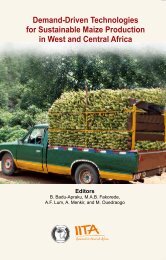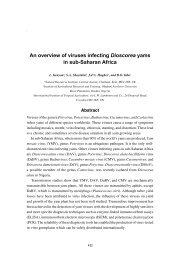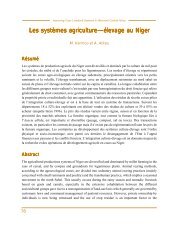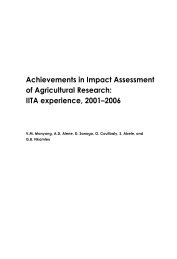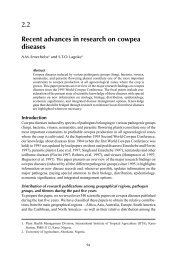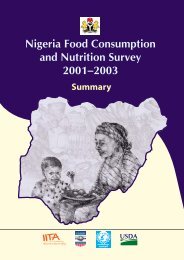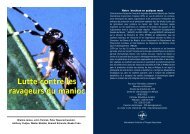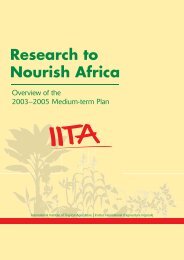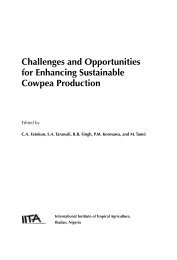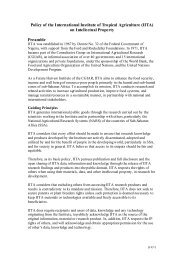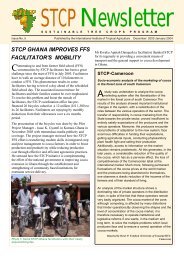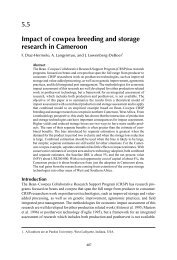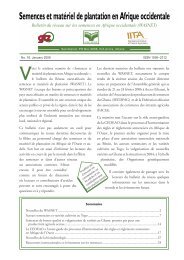Hot water treatment of banana and yam planting material - IITA
Hot water treatment of banana and yam planting material - IITA
Hot water treatment of banana and yam planting material - IITA
You also want an ePaper? Increase the reach of your titles
YUMPU automatically turns print PDFs into web optimized ePapers that Google loves.
<strong>IITA</strong>I N I T I A T I V E S<strong>Hot</strong> <strong>water</strong> <strong>treatment</strong> <strong>of</strong> <strong>banana</strong> <strong>and</strong> <strong>yam</strong><strong>planting</strong> <strong>material</strong>The challengeHighl<strong>and</strong> <strong>banana</strong>, plantain, <strong>and</strong> <strong>yam</strong>s are important food crops in Africa.Banana <strong>and</strong> plantain are staple foods for more than 70 millionpeople. Yams are a preferred carbohydrate for many people, <strong>and</strong> play amajor role in West African culture.Among other pests <strong>and</strong> diseases, worm-like nematodes can cause seriousdamage to these crops.Nematodes attack the roots <strong>and</strong>corms <strong>of</strong> <strong>banana</strong> <strong>and</strong> plantain,drastically reducing the bunchweight, <strong>and</strong> in extreme casesYam tuber dry rot caused by ScutellonemaHighl<strong>and</strong> <strong>banana</strong> roots destroyed by Radopholus similisbradys.causing the plant to topple sothat the bunch is lost. Averageproduction losses due to nematodes are estimated at 30% <strong>of</strong> the harvest for highl<strong>and</strong> <strong>banana</strong> in East Africa, <strong>and</strong> can exceed60% for plantain in West Africa.Nematode damage to <strong>yam</strong>s can occur either during crop growth or during storage. Infestation during the growing seasonresults in poor plant development <strong>and</strong> reduced tuber weight, <strong>and</strong> hence lower market value. Even more damage is causedwhen nematode-infested <strong>yam</strong> tubers are put into storage. Nematodes cause dry rotting or severe galling <strong>of</strong> the <strong>yam</strong> tuber,which can be exacerbated by secondary infection by fungi <strong>and</strong> bacteria. More than 80% <strong>of</strong> stored tubers can be lost thisway, seriously depleting the farmer’s source <strong>of</strong> available food <strong>and</strong> potential income. Moreover, up to a third <strong>of</strong> stored <strong>yam</strong>tubers are used for <strong>planting</strong> the following season, <strong>and</strong> a nematode attack can significantly reduce the quantity, quality, <strong>and</strong>viability <strong>of</strong> this <strong>planting</strong> <strong>material</strong>.Nematodes are usually introduced to farml<strong>and</strong>s through the use <strong>of</strong> infected<strong>planting</strong> <strong>material</strong>. The nematodes are embedded deep in the plant tissue.Meeting the challengeOne control measure promoted by <strong>IITA</strong> is to immerse the <strong>banana</strong>, plantain,or <strong>yam</strong> <strong>planting</strong> <strong>material</strong> in warm <strong>water</strong>, at an optimum temperature <strong>of</strong>53°C, for approximately 20 minutes. This kills the nematodes in the tissuewithout affecting the germination <strong>of</strong> the <strong>planting</strong> <strong>material</strong>. Plants cleaned inthis way can then be planted in new farml<strong>and</strong>, or l<strong>and</strong> where break cropshave been grown for one or two years, so that nematode numbers in the soilare low.This simple control method is low cost, environmentally friendly, <strong>and</strong> relativelyeasy for farmers to practice. A 1 m 3 tank is <strong>of</strong>ten used for the <strong>treatment</strong>,heated by propane gas, <strong>and</strong> easily transportable on a pick-up truck.Banana <strong>planting</strong> <strong>material</strong> treated in <strong>water</strong> <strong>of</strong>53ºC for 20 minutes
This <strong>treatment</strong> is most effective when combined with other pest management strategies,for example regular weeding, crop rotation including nonhost plants, <strong>and</strong> use <strong>of</strong>pest-resistant cultivars.The impactWhen hot <strong>water</strong>-treated <strong>banana</strong> or plantain <strong>planting</strong> <strong>material</strong> is planted in previously uncultivatedl<strong>and</strong> it can take 3–5 years before the plants are reinfested by nematodes to asignificant level. During this period production can be up to 50% higher compared withuntreated <strong>planting</strong> <strong>material</strong>, with the help <strong>of</strong> good management practices, especiallyweeding. Using this <strong>treatment</strong>, plantain’s plantationlife <strong>of</strong> two or three cycles can increase to fiveor more cycles. This means less pressure on thel<strong>and</strong> as it reduces the need to clear new areas forA clean healthy <strong>yam</strong>farming.Treatment <strong>of</strong> <strong>yam</strong> tubers before storing reducesdamage in storage, <strong>and</strong> significantly improves the next season’s harvest. Combining hot <strong>water</strong> <strong>treatment</strong> with other innovationscan have added benefits.In Ghana, where the availability <strong>of</strong> plantain <strong>planting</strong> <strong>material</strong> is a major production constraint, farmers effectively combinethis technology with rapid multiplication <strong>of</strong> plantain <strong>planting</strong> <strong>material</strong>.The future<strong>IITA</strong> research in future will focus on:• facilitating adaption <strong>and</strong> adoption <strong>of</strong> the technology by farmer communities<strong>and</strong> NGOs• developing alternative designs <strong>of</strong> the tank <strong>and</strong>/or developing multiple uses forthe tank, so that it can be used at village level• the use <strong>of</strong> clean <strong>planting</strong> <strong>material</strong> for the dissemination <strong>of</strong> beneficialorganisms, such as those that help control the <strong>banana</strong> weevil or nematodes, orthat improve plant growthHealthy <strong>banana</strong> <strong>planting</strong> <strong>material</strong>Productive highl<strong>and</strong><strong>banana</strong>For further information, or if you would like to help fund this or similar work, please contact:Director GeneralInternational Institute <strong>of</strong> Tropical AgricultureOyo Road, PMB 5320, Ibadan, NigeriaTelephone: (+234 2) 241 2626Fax: (+234 2) 241 2221E-mail: iita@cgiar.orgor visit <strong>IITA</strong>’s website: www.cgiar.org/iitaInternational mailing address<strong>IITA</strong>, c/o L.W. Lambourn & Co.Carolyn House26 Dingwall RoadCroydon CR9 3EEUnited KingdomInternational Institute <strong>of</strong> Tropical AgricultureA member <strong>of</strong> the Consultative Group on International Agricultural Research



